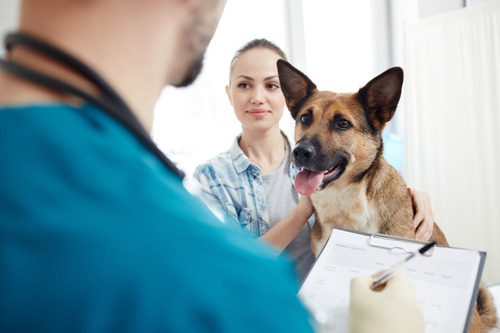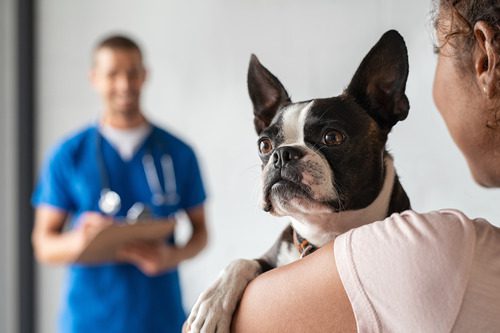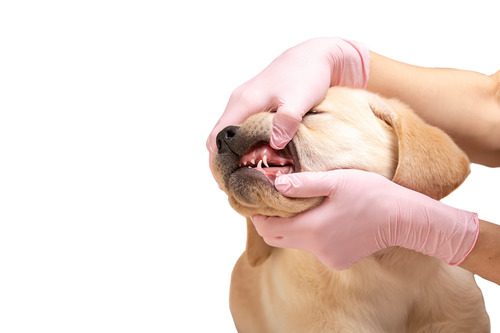What Causes and How to Treat Blood Blisters on Dog
Blood blisters, medically known as hematomas, are a common yet alarming issue that dog owners might encounter. These blisters typically appear as raised red or purple spots on the skin and can be caused by a variety of factors. It’s important for pet owners to recognize the signs of a blood blister on a dog and understand the potential underlying causes. This knowledge can help in seeking timely veterinary care from professionals like those at Best Friends Veterinary Hospital. Timely consultation can mitigate the risk of complications and ensure the health and comfort of your beloved pet.

Identifying the Causes of Blood Blisters
Blood blisters on dogs can arise from several different scenarios. Each cause may affect the treatment approach, so understanding these can be essential in ensuring your dog’s health and well-being.
Trauma-Induced Hematomas
Trauma is the most frequent cause of blood blisters in dogs. This can happen when your dog bumps into hard objects, gets caught in a door, or is involved in a rough play. The impact causes blood vessels beneath the skin to rupture, forming a pool of blood between the skin layers that appears as a blister.
Allergic Reactions
Allergies are another common cause of skin issues in dogs, including the formation of blood blisters. Allergic reactions can be triggered by a variety of substances, such as food, pollen, or flea bites. The skin’s response to the allergen can result in inflammation and blistering.
Other Medical Conditions
Certain medical conditions like autoimmune disorders or blood clotting problems can also lead to the appearance of blood blisters. These conditions disrupt the normal functioning of the body’s immune system or coagulation processes, making blood blisters more likely.
Treating Blood Blisters in Dogs
When it comes to treating a blood blister on a dog, it’s crucial to consult a veterinary professional. Treatment will vary depending on the underlying cause of the blister.
Veterinary Diagnosis and Care
The first step in treating a blood blister is getting a precise diagnosis. At Best Friends Veterinary Hospital, our team uses state-of-the-art diagnostic tools to determine the cause of the blister. Treatment might include draining the blister or prescribing medications such as antibiotics or anti-inflammatories depending on the associated conditions.
Monitoring and Follow-up
After initial treatment, monitoring the blister is crucial. Owners should watch for signs of infection or any changes in the size or appearance of the blister. Regular follow-up visits to the vet will help ensure that the blister is healing properly and not leading to further complications.
Preventing Blood Blisters in Dogs
While not all blood blisters can be prevented, there are steps that dog owners can take to minimize the risk:
- Regular Vet Visits: Routine check-ups can catch early signs of conditions that might lead to blood blisters. Early detection and treatment can prevent many issues from escalating.
- Safe Environment and Allergy Management: Creating a safe environment for your dog and managing allergies can help reduce the risk of blood blisters. Avoid exposing your dog to known allergens and use flea prevention strategies as recommended by your vet.
- Educate on Signs and Symptoms: Being educated about what to look out for can also help prevent serious issues. Knowing the signs of allergic reactions or when an injury needs veterinary attention is key.
Protect Your Dog’s Health: Contact Best Friends Veterinary Hospital
Blood blisters on dogs can be a sign of various underlying issues. It’s essential to not treat these blisters at home but instead contact a veterinarian promptly. At Best Friends Veterinary Hospital, we are here to provide your dog with the care they need. If you notice any signs of blood blisters or other health concerns, call us today to schedule a consultation. Our dedicated team is committed to ensuring your dog’s health and helping them lead a happy, active life.
Recent Posts
About Best Friends Veterinary Hospital
Our veterinarians and staff warmly welcome dogs, cats, and a variety of exotic pets as patients here at our animal hospital, and we offer a host of services to give your unique family member a lifetime of excellent care.




